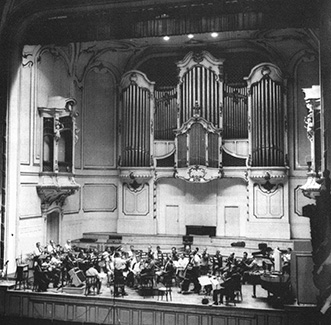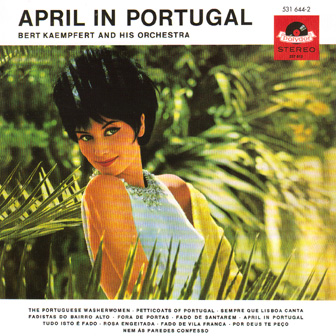
"I want to make music for everyone. It must be enjoyed by all. Otherwise it is pointless."
This compact disc has the title, track sequence and (in the booklet) cover art of the 1963 Polydor Lp reissue. See also the original album Portugal - Fado, Wine and Sunshine.
Polydor 531 644-2 (deleted)
 The recordings on the present compact disc, set down in 1958 in the Hamburg Musikhalle by the balance engineer Karl Hinze and typical of the popular music of the day, were originally released under the title PORTUGAL-FADO, WINE AND SUNSHINE (catalogue no. 237 506 SLPHM), but in a different coupling and even with two different covers: it was Bert Kaempfert's very first LP.
The recordings on the present compact disc, set down in 1958 in the Hamburg Musikhalle by the balance engineer Karl Hinze and typical of the popular music of the day, were originally released under the title PORTUGAL-FADO, WINE AND SUNSHINE (catalogue no. 237 506 SLPHM), but in a different coupling and even with two different covers: it was Bert Kaempfert's very first LP.
With the exceptions of The Portuguese Washerwomen (from the French film of the same name) and the evergreen April In Portugal, all the compositions are relatively unknown in this country being chiefly Portuguese in origin.
To quote the commentary on the original LP cover: "The greater part of [the pieces] is based on fados, the typical Portuguese songs which are accompanied by guitars. The fados can be heard in the authentic atmosphere of the little cafés that are mainly frequented by Portuguese.
 Here, amid smoke and wine, the fados are sung by entertainers and customers alike. These haunts are found mainly in the Bairro Alto and Alfama, picturesque quarters of Lisbon, which are eagerly watching over their old tradition. Characteristic for the fados are their rich and conceivable melodies which make them highly listenable to everybody.
Here, amid smoke and wine, the fados are sung by entertainers and customers alike. These haunts are found mainly in the Bairro Alto and Alfama, picturesque quarters of Lisbon, which are eagerly watching over their old tradition. Characteristic for the fados are their rich and conceivable melodies which make them highly listenable to everybody.
Bert Kaempfert's musicians are recruited from the North German Radio (NDR) Orchestra and members of the Viktor Reschke Orchestra, at that time the NDR television orchestra. The concertmaster is Herbert Rehbein, a very old friend of Kaempfert's and co-author of numerous compositions. Ladi Geisler is also not to be missed - not yet with his memorable "cracking" bass guitar but playing a normal electric guitar tuned especially low (in place of an electric bass guitar which was seldom heard in those days). Bert Helsing not only plays the solo guitar but also a bandurrilha - an instrument upon which two strings are plucked simultaneously to produce a tone, similar to the mandoline (April in Portugal); further soloists include Rudi Bohn (piano) and Karl Elsner (flute). The delightfully yearning and lyrical sound of Johnny Muller on the harmonica is particularly enjoyable in the compositions Tudo isto é fado and Nem ás paredes confesso.
Volker Rippe
Translation: Angela Schumacher